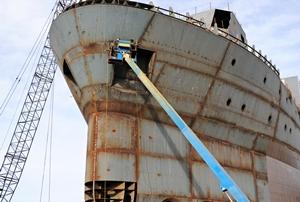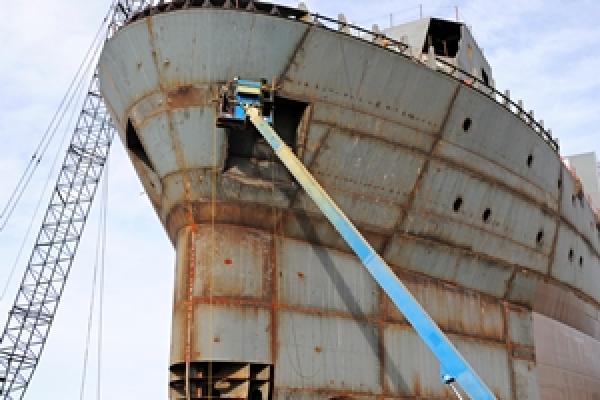
Steamship Mutual
Published: September 01, 2011

Nanjing Tianshun Shipbuilding Co Ltd and Jiangsu Skyrun international Group Co Ltd v Orchard Tankers PTE Ltd [2011] EWHC 164 (Comm)
This was a dispute arising from a shipbuilding contract which the buyer had purported to cancel on grounds of late delivery.
The Contract
The form of shipbuilding contract was relatively conventional. Payment of the contact price was due in advance in four instalments. A bank guarantee was to be provided on behalf of the seller as security for repayment on a wording prescribed in the shipbuilding contract.
The buyer would become entitled to terminate the contract if delivery of the vessel was delayed beyond defined limits. The time for performance could be extended in case of force majeure and certain other permissible delays.
If the buyer served notice of cancellation in accordance with the terms of the contract, the seller would be required to refund the instalments and all obligations between the parties would then be discharged. If the seller failed to refund the instalments, the refund guarantor would be liable to pay within 30 days from receiving a written demand. In case of a dispute over the buyer’s entitlement to cancel, the seller could refer the matter to arbitration within 30 days (Article X).
“…The Seller shall have the right to dispute the Buyer’s cancellation and/or rescission by instituting arbitration in accordance with Article XIII, if such institution of arbitration is made within thirty (30) days of the Buyer’s cancellation and/or rescission.
If Buyer’s cancellation and/or rescission of this Contract is disputed by the seller as aforesaid, then the Seller may not refund the Buyer until an arbitration award is handed down…”
Properly serving notice of arbitration would suspend the seller’s and the refund guarantor’s obligation to repay the instalments while the dispute was being resolved. The duration of the refund guarantee would also be automatically extended to 90 days after the date of publication of an arbitration award or final court order (if the award was appealed).
Under the terms of the guarantee, once an arbitration award (or final court order) was published, if the seller then failed to satisfy the award or judgment within 30 days of the buyer’s demand, the refund guarantor would again become liable to do so.
The contract contained a dispute resolution clause (Article XIII) providing for either expert determination or London arbitration, depending on the nature of the dispute, with no express contractual time limit. Disputes falling outside the scope of Article XIII would be subject to the jurisdiction of the English courts and English law would apply.
“…
ARTICLE XIII
1. RULES, REGULATIONS AND REQUIREMENTS OF CLASSIFICATION SOCIETY REQUIREMENT
If any dispute or any difference shall arise between the parties hereto with regard to this CONTRACT or the Specifications such dispute as to conformity of any construction or material with Classification Society requirements shall be submitted to the head office of the Classification Society surveyor or as regards any other dispute or difference by mutual agreement to such other expert as may be agreed between the parties hereto and in either event the decision of such surveyor or expert shall as the case may be final, conclusive and binding on the parties hereto.
2. DISPUTE UNDER ARBITRATION
In the event that any dispute other than Paragraph 1 above shall arise relating to the construction of the VESSEL, such dispute shall be resolved by arbitration in London, England in accordance with the rules of the 1996 Arbitration Act or any statutory modification or re-enactment thereof for the time being in force subject to the following provisions of this Article.
[…]
3. JURISDICTION AND FORUM
In the event that any dispute shall arise out of this CONTRACT between the SELLER and the BUYER, which dispute is not otherwise governed by Paragraph 1 or 2 of this Article, such dispute shall be resolved in and subject to the jurisdiction of England and the courts in London, England. English law to apply.
…”
The Dispute
Having paid all four instalments, the buyer gave notice of cancellation on grounds of late delivery. The seller responded by serving notice of arbitration, however, the notice was served after the 30 day time limit specified in Article X had expired.
The seller was refusing to refund the instalments and the refund guarantor was refusing to pay under the guarantee, maintaining that the commencement of arbitration proceedings, whether or not timely, suspended its obligations until the matter was resolved by arbitration.
It was argued that the time limit for commencing arbitration was remedy-barring but did not affect the seller or refund guarantor’s right to claim against the buyer in the High Court for recovery of any amounts paid under the guarantee.
The seller offered an “alternative and preferable” construction of the contract in their skeleton argument:
“…
i) The Seller is barred from arbitrating its dispute regarding termination unless it does so within 30 days: thus ensuring that the bank can never raise a defence to a claim under the guarantee on the grounds of an extant arbitration if no arbitration has been stated within 30 days. But this does not impinge upon the Bank or the Seller’s right to claim against the Buyer for recovery of monies paid under the guarantee.
ii) In the alternative the parties did not intend the time bar in Article X.2 to apply to an arbitration which falls under Article XIII.2. Article X.2 gives the Sellers the right to arbitrate a dispute which would otherwise not be arbitrable because it falls within Article XIII.1 or XIII.3. That right is subject to a requirement that the Seller initiates the arbitration within 30 days. If the Seller does not, then he loses that right and the dispute must be resolved as per the default position in Article XIII.
…”
The buyer submitted that the seller had missed the opportunity to dispute cancellation, as a timely arbitration notice was not served (as required by Article X) and the seller’s claim was absolutely barred.
The Application
The seller applied to the High Court under s. 67 Arbitration Act 1996, challenging the jurisdiction of the tribunal, which the seller itself had instituted. In other words, the question referred to the Court was whether or not the claim in question fell within the scope of the arbitration agreement contained in the shipbuilding contract.
Alternatively, the seller sought the Court’s permission, pursuant to s.69 of the Act, to appeal awards made by the tribunal on a question of law, namely whether as a matter of English law a party’s right of suit can only be extinguished by clear language to that effect in the relevant time bar clause.
The parties agreed that the issue of jurisdiction would be determined first.
The Decision
Mr Justice Steel, with little hesitation, preferred the buyer’s construction of the contract, holding that the seller’s right to dispute the cancellation had lapsed.
It made no commercial sense for parties to specify that claims were to be referred to arbitration promptly within 30 days, only to provide for stale claims to be litigated. The courts were generally reluctant to construe a clause as “remedy-barring” (as opposed to “claim barring”) for this reason.
Metalfer Corporation v Pan Ocean Shipping Co Ltd [1998] 2 Lloyd’s Rep. 632 and Metalimex Foreign Trade Corp v Eugenie Maritime Ltd [1962] 1 Lloyd’s Rep. 378 were cited in support of this approach in circumstances where the wording of the time bar clause left room for doubt as to whether the clause was intended by the parties to bar a claim entirely. The absence of clear claim-barring words did not put the effect of a particular time bar clause beyond question “…Metalimex and Metalfer [were] eloquent witness to that in circumstances where it is necessary in order to give some meaning to the contract: see The Pera [1985] 2 Lloyd’s Rep. 103 at 106”.
In the present case:
- both the time bar clause and the guarantee referred specifically to the commencement of arbitration in accordance with Article XIII (the shipbuilding contract’s dispute resolution clause);
- the continuance of the guarantee beyond 90 days after the delivery date depended upon the existence of arbitration proceedings pursuant to Article XIII;
- the contract clearly provided that refunding the instalments would discharge all the parties’ obligations; and
- the refund guarantor’s liability under the guarantee only arose where the instalments became repayable but the seller failed to repay them.
It could not be correct, therefore, that the seller would later be entitled to pursue the buyer for sums paid under the guarantee; nor was there any basis for reading Article X (which contained the cancellation and time bar provisions) as a specific right to arbitrate, separate from Article XIII, as the seller had submitted. The seller’s approach “failed at every stage of the argument”.
From a buyer’s perspective, it was important that shipbuilding contracts contained a mechanism by which advances could be recovered simply and quickly should a builder default on the performance of his obligations. It was precisely such a mechanism which the parties had intended would operate in this case.
The seller’s applications under both s.67, and for leave to appeal under s.69 Arbitration Act 1996, were dismissed.
Comment
This case underlines the importance of carefully reviewing the terms of a contract and taking prompt advice in the event of an actual or anticipated dispute, to ensure that all time limits are adequately protected.
Article by Andrew Hawkins


